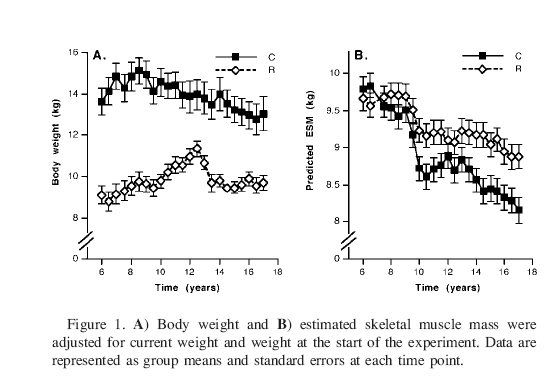Attenuation of sarcopenia by dietary restriction in rhesus monkeys.
Colman RJ, Beasley TM, Allison DB, Weindruch R.
Wisconsin National Primate Research Center, University of Wisconsin-Madison, 1220 Capitol Ct., Madison, WI 53715. rcolman@primate.wisc.edu.
Sarcopenia, the loss of muscle mass with normal aging, devastates quality of life-and related healthcare expenditures are enormous. The prevention or attenuation of sarcopenia would be an important medical advance. Dietary restriction (DR) is the only dietary intervention that consistently extends median and maximum life span, as well as health span in rodents. Evidence suggests that DR will have a similar effect in primates. Furthermore, DR opposes sarcopenia in rodents. We tested the hypothesis that DR will reduce age-related sarcopenia in a nonhuman primate. Thirty adult male rhesus monkeys, half fed a normal calorie intake and half reduced by 30% in caloric intake, were examined over 17 years for changes in dual-energy X-ray absorptiometry-estimated skeletal muscle mass. Body weight-adjusted skeletal muscle mass declined somewhat in both groups but was far more rapid in the control group. We have shown that moderate, adult-onset DR can attenuate sarcopenia in a nonhuman primate model.
PMID: 18559628 [PubMed - in process]
If anyone has the paper I'd appreciate a look




















































